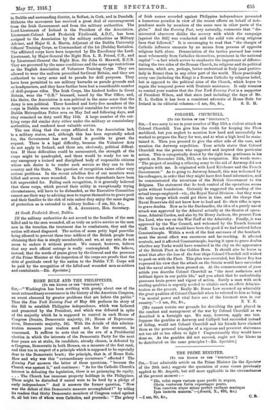COLONEL CHURCHILL TO THE EDITOR Of TUE " SPECTITOR.1
Sra,—I was sorry to see in your number of May 13th a violent attack on Colonel Churchill. You give him the credit for keeping the Fleet mobilized, but you neglect to mention how hard and successfully he worked to prepare the Navy for war, and at what a high level he main- tained it. Then you proceed to give the other side of the case, and mention the Antwerp expedition. Your article states that Colonel Churchill was the person who suggested and inspired this particular action. This is categorically denied by the right hon. gentleman in his speech on November 15th, 1915, on his resignation. His words were : " The project of sending a relieving army to the aid of Antwerp did not originate with me. It originated with Lord Kitchener and the French Government." As to going to Antwerp himself, this was welcomed by his colleagues, in order that they might have first-hand information, and he communicated the intentions of the British Government to the Belgians. The statement that he took control of the operations seems quite without foundation. Certainly he suggested the sending of the
actual troops employed—viz., the Royal Naval Division—but they were the only troops which could get there in time, and the charge that
Naval Reservists did not know how to load and firs their rifles is open to grave doubts. Now as to the Dardanelles, the idea of a purely naval attack was approved by the Admiral actually at the theatre of opera- tions, Admiral Carden, and also by Sir Henry Jackson, the present First
Sea Lord, who was on the War Staff at the Admiralty. Finally, it was approved by the War Council, and welcomed by the French General
Staff. You ask what would have been the good if we had arrived before
Constantinople. Within a week of the first successes of the bombard- ment the moral effect was enormous and far-reaching. It affected
neutrals, and it affected Constantinople, leaving it open to grave doubts whether any Turks would have remained in the city on the appearance of the British Fleet in the Golden Horn. It should also be borne in mind that after the loss of the four ships Colonel Churchill still wished
to push on with the Fleet. This plan was overruled, but Envor Bey has expressed his view that the attack on the Straits would have succeeded
had the naval attack been pressed on. At the commencement of your article you describe Colonel Churchill as " the most audacious and brilliant figure in our public life," and you admit that he undoubtedly possesses brain-power and vigour of action. Surely a man with such sterling qualities is urgently needed to vitaliie such an effete Adminis- tration as the present. Really Mr. Bonar Law summed up admirably the great qualities of Colonel Churchill when he referred to him as being "in mental power and vital force one of tho foremost men in our
[We cannot restate our grounds for describing the part played is the conduct and management of the war by Colonel Churchill as we described it a fortnight ago. We may, however, apply one test. Suppose the gambles at Antwerp and Gallipoli had succeeded instead of failing, would not Colonel Churchill and his friends have claimed them as the personal triumphs of a vigorous and prescient statesman not too old or too effete to fight ? Unquestionably they would have done so. As the gambles did not succeed, ought not the blame to be distributed on the same principles ?—ED. Spectator.]






























 Previous page
Previous page